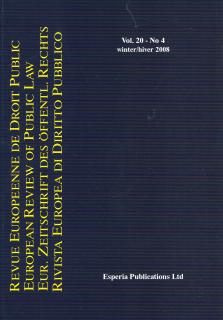
Popular Involvement in Constitution-Making
Kostas Chryssogonos
Professor of Constitutional Law, Faculty of Law, Aristotle University of Thessaloniki, Greece
Several new constitutions are not the product of a domestic constituent power, but the result of international politics. Another tendency is the adaptation of the Constitution to the requirements of international law concerning human rights and/or transnational (European) integration. The main thesis of this paper is that the two aforementioned developments are distinct and that authentic constituent power, leading to a viable authoritative (normative) Constitution, has to be domestic, although international and/or EU law can pose limits to its exercise. Historical experience shows that in most cases the process of exercising authentic constituent power entails determinant participation by a collective representative body that has been freely elected by the people(s) concerned. If a constitutional text is prefabricated by someone else (a sovereign monarch, a ruling party in an one-party state, an Intergovernmental Conference, a foreign state or an international organization), then its life expectancy is rather short and its normative character suspect from the beginning.





















